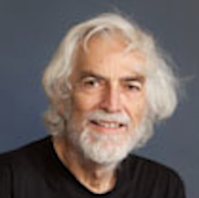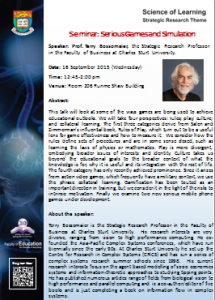Seminar: Serious Games and Simulation

Speaker: Prof. Terry Bossomaier, the Strategic Research Professor in the Faculty of Business at Charles Sturt University.
Date: 16 September 2015 (Wednesday)
Time: 12:45-2:00 pm
Venue: Room 206 Runme Shaw Building
Abstract:
This talk will look at some of the ways games are being used to achieve educational outlooks. We will take four perspectives: rules; play; culture; and collateral learning. The first three categories derive from Salen and Zimmerman’s influential book, Rules of Play, which turn out to be a useful lens for game effectiveness and how to measure it. We consider how the rules define sets of procedures and are in some sense closed, such as learning the laws of physics or mathematics. Play is more divergent, embodying broader issues of interests and identity. Culture takes us beyond the educational goals to the broader context of what the knowledge is for, why it is useful and its integration with the rest of life. The fourth category has only recently achieved prominence. Since it arises from action video games, which frequently have a military context, we use the phrase collateral learning. Gamification has been touted as an important direction in training, but we consider it in the light of the risks to intrinsic motivation. Finally we examine two new serious mobile phone games under development.
About the speaker:
Terry Bossomaier is the Strategic Research Professor in the Faculty of Business at Charles Sturt University. His research interests are very diverse, ranging from vision to high performance computing. He co-founded the Asia-Pacific Complex Systems conferences, which have run biennially since the early 90s. At Charles Sturt University he set up the Centre for Research in Complex Systems (CRiCS) and has run a series of complex systems research summer schools since 1998. His current research interests focus on the agent based modelling of socio economics systems and information-theoretic approaches to studying tipping points. He has published numerous articles range of fields from biological vision to high performance and parallel computing and is a co-author/editor of five books and is just completing a book on information flow in complex systems.



